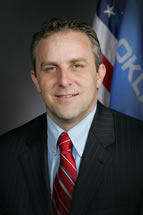Senate approves bill to stop repeat DUI offenders
 Sen. Greg Treat
Sen. Greg Treat
A measure to track and keep repeat impaired drivers off Oklahoma roads passed the Senate unanimously Tuesday. House Bill 3146, authored by Sen. Greg Treat and Rep. Mike Sanders, will require all driving under the influence (DUI) cases to be handled by courts of record.
“This bill closes a loophole that has put Oklahomans’ lives in danger by allowing repeat drunk drivers to get multiple DUI convictions in various jurisdictions without being held accountable,” said Treat, R-Oklahoma City. “There are 350 courts not of record in Oklahoma that don’t report DUI convictions to a statewide database. Therefore, someone could get arrested twenty or more times in multiple jurisdictions for DUI and because those convictions aren’t put on their record they’re treated like a first time offender and receive only minimal punishment.”
Currently, Oklahoma City and Tulsa are the state’s only municipal courts of record. Only those convicted in these two courts are held accountable on subsequent offenses because their crimes are reported to the Oklahoma Supreme Court Network.
Under HB 3146, municipal courts not of record will no longer be eligible to hear DUI cases. Any municipality with a population of 60,000 or more has the option to create a court of record. DUI cases in jurisdictions with courts not of record will be referred to district court. Arresting municipalities will still receive a portion of the fines.
Rep. Sanders and his family were the victims of a drunk driver who rear-ended them last year. The individual had six open containers in his vehicle and four DUI convictions in the previous year. He received another DUI citation two weeks after hitting the Sanders’ family.
“This is an important tool for prosecutors to be able to better flag and appropriately prosecute repeat drunk drivers,” said Sanders, R-Kingfisher. “The security of Oklahoma families when they are driving on our roads should always be a top priority in public safety.”
The bill requires the state Department of Public Safety, with the help of the Office of Management and Enterprise Services, to create a statewide impaired driver database to better track offenders to be funded by fines on offenders.
The bill now heads to the Governor’s desk for her consideration.
 Oklahoma Senate
Oklahoma Senate

